1:1 2:2 散裝 采样拭子 基因采样套装 上海厂家 植绒拭子
供应零售DNA收集管 无菌唾液采集器 DNA唾液采集细胞器
DNA基因检测唾液采集器 含口液保存液 DNA唾液采集器
鼻咽拭子 咽拭子 口腔采样棒 鼻腔取样器 DNA采样拭子
鼻咽拭子 咽拭子 口腔采样棒 鼻腔取样器 DNA采样拭子
订货热线
固话总机:021-50837765
订货热线:15221999938
【产品说明】 本产品是日本新尼龙植绒技术生产,是国际新专利生产技术。在国外大量临床试验表明:与普通无菌拭子相比,尼龙植绒拭子有着更好的对临床生物样本的采集与运送效果,尤其是对于那些不能及时送检,放置时间过长的样本而言更是如此。
性能:
1、连接强度:拉力试验机夹具的移动速率为200㎜/min时;采样头与连接杆的一端拔脱力应不小于2N,
2、断裂强度:试验跨距为6㎝时.拭子应能承受4N轴向的静压力,.持续15s而不产生永久变形或折断
现象。
3、旋转摩擦度:在ABS杆上粘胶后喷植尼绒毛,耐摩牢度指在测试不大于2N,旋转摩擦360度不小于3次,表面脱尼绒毛量不大于2根。
【产品功效】 无菌一次性采样植绒拭子是日本新技术产品,是国际专利生产技术。无菌一次性采样植绒拭子已通过国家质量监督医疗器械检测中心进行全项目检测,并出具检测ZC1011965/96/97合格报告。采样拭子分为咽拭子、口腔拭子、DNA拭子、宫颈拭子,能供各种实验室检测中心和医院使用。采样植绒拭子比传统缠绕拭子采集样本和释放样本的量高3倍,而且对细胞样本不造成损害,好好的保证细胞样本的存活率,不残留脂肪酸,对试验检测效果不造成影响,更不会对人体造成伤害。
鼻腔采样拭子供医疗机构采集患者鼻腔内感染的病毒及DNA样本;
口腔采样拭子供医疗机构采集患者口腔内及咽喉感染的病毒及DNA样本;
宫颈采样拭子供医疗机构采集妇女阴道内及宫颈感染的病毒样本,适用妇女患者,用来采集子宫颈上皮脱落细胞,用于人乳头瘤病毒(HPV)核酸。
我们卖的是产品,卖的是服务,卖的是诚信。
客户第一,质量至上,快速响应,持续改善。
不同的型号价格不同,不同的工艺材料质量不同价格,欢迎来电咨询15221999938,朱先生
我们卖的是产品,卖的是服务,卖的是诚信。
客户第一,质量至上,快速响应,持续改善。
订货热线
固话总机:021-50837765
订货热线:15221999938
产品描述:
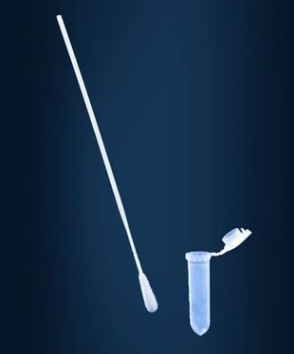
无菌一次性采样植绒拭子是日本新技术产品,是国际新专利生产技术。采样拭子分为咽拭子、口腔拭子、DNA拭子、宫颈拭子,能供各种实验室检测中心和医院使用。采样植绒拭子比传统缠绕拭子采集样本和释放样本的量高3倍,而且对细胞样本不造成损害,好好的保证细胞样本的存活率,不残留脂肪酸,对试验检测效果不造成影响,更不会对人体造成伤害。
产品用途:
尼龙植绒拭子用途广泛,在用于细菌学样本处理、病毒学细胞培养、DFA检验、快速直接的检验、酶免疫法检测、聚合酶链反应和基于分子诊断的检测,以及法医鉴定时都十分理想。也可用于流感、猪流感、禽流感、手足口等呼吸道病毒的咽喉部采样。
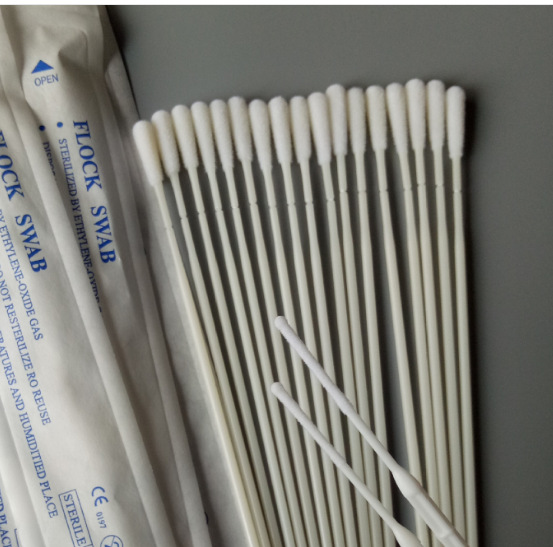
产品特点:
1.具有超常的吸水能力,可以将其表采集的标本数量由传统采样拭子的20%提高到了60%
2.对收集到的标本有超过90%的释放率,从而确保了结果的高度可靠性
3.针对不同的标本类型选用了不同的保存液
4.塑料杆上有独特的可折断设计,方便标本运输
5.环氧乙烷或辐照灭菌,独立包装
口腔拭子其原理是采集口腔上皮黏膜细胞,通过检测这些细胞中的DNA来完成基因检测鉴定。
细胞基因组采样首选,DNA采集就是用这种,采集量大,刮取口腔黏膜脱落细胞,
采样头_采样刷/唾液收集刷/一次性取样刷
产品描述:
医用牙刷型采样冠,PP采样套杆推杆结构。
采样冠采用之物料对微生物无毒害,能大量增加样本的采集、释放量及提高样本送检期间之保存效果。
可单手操作,采样完毕,用推杆将采样冠推入样品收集管内,避免污染,方便使用。
产品为纸塑袋密封包装,辐射消毒。
基因套装为2支装牙刷型拭子和2个保存液管搭配进行采样,配合一次采集一人口腔内左右两边腮。
口腔拭子就是一个形状和牙刷差不多的东西,将拭子伸进口腔,在口腔内壁来回挂拭多次,然后将拭子自然晾干,包装起来送往检测机构检测即可。
其原理是采集口腔上皮黏膜细胞,通过检测这些细胞中的DNA来完成基因检测鉴定。
配合细胞保存液长期保持细胞,细胞保存液采用日本进口细胞保存液,常温有效保存2年时间,适合磁珠提取和吸附柱法提取DNA
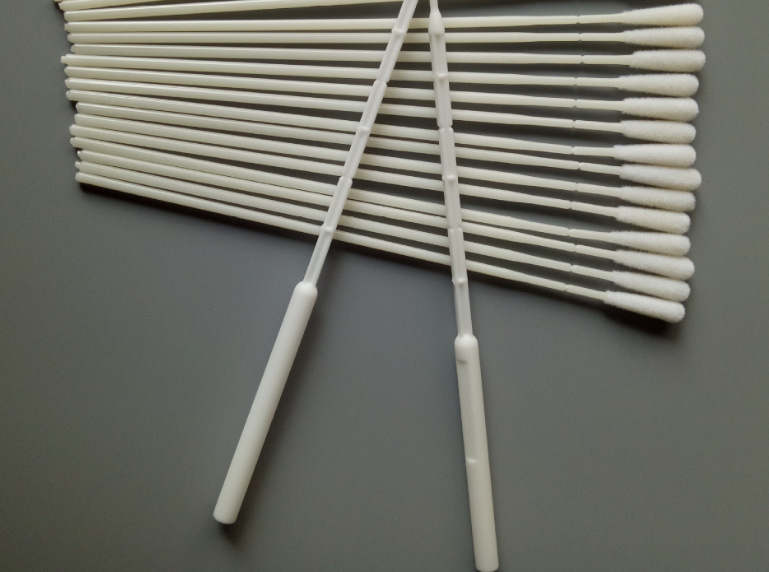
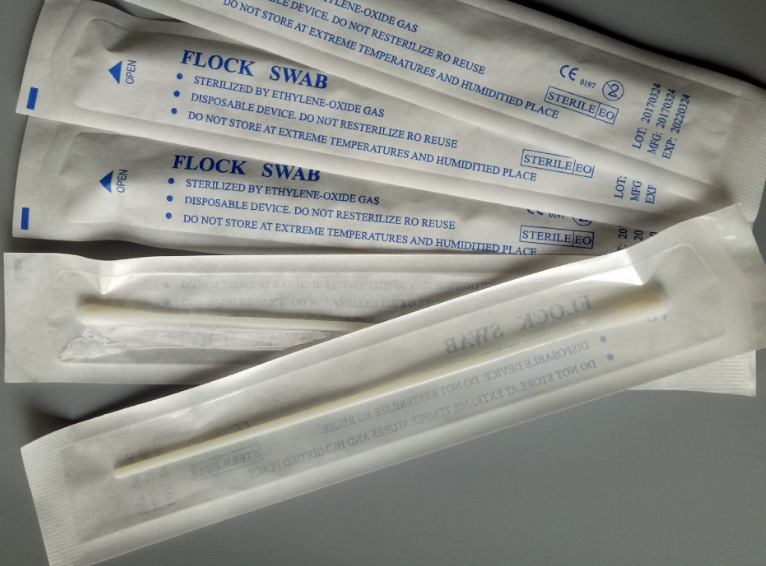
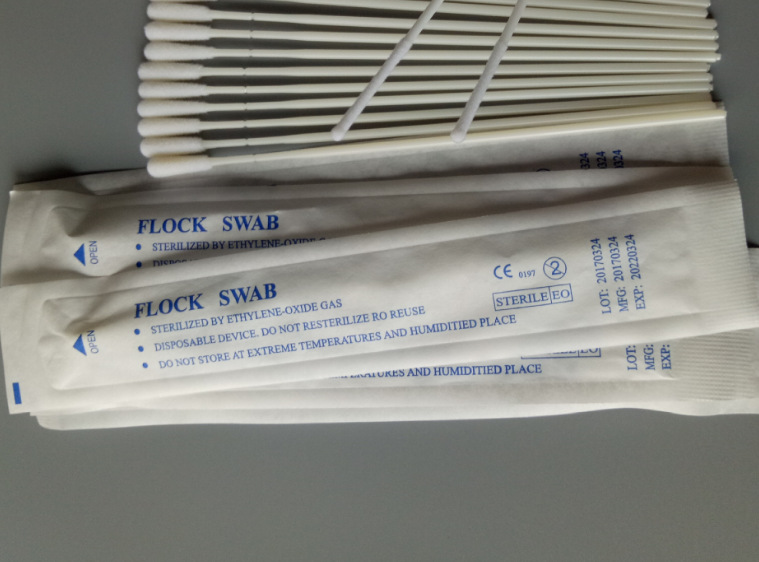
我们卖的是产品,卖的是服务,卖的是诚信。
客户第一,质量至上,快速响应,持续改善。
订货热线
固话总机:021-50837765
订货热线:15221999938
日本进口唾液DNA保存液
基因检测用什么采集唾液
日本进口唾液DNA保存液
基因检测用的工具有哪些:
采样拭子,唾液采集器,唾液采集管,唾液收集管,细胞采样刷
新型涉及一种唾液采集设备,包括吸管、唾液管以及稳定液保存管,所述唾液管包括密封盖,所述唾液管内设置有针状取液机构,用于获取稳定液保存管中的稳定液,所述取液机构为一端设有针尖的棒体,所述稳定液保存管设置有能被针尖刺穿的取液区。本实用新型提供的唾液采集设备,通过设置吸管的唾液管,能够实现自助或通过他人辅助完成唾液采样;此外,更为重要的是,通过设置稳定液保存管,能够实现在室温状态下长期保持唾液样本中DNA和RNA的稳定性。
上海金畔生物科技有限公司专业唾液采集器生产厂家,公司专注于唾液中核酸样品的收集与纯化技术,提供了包括收集人类、实验与伴侣动物和牲畜的唾液中核酸样本的解决方案,在该领域居于全球领先地位。
公司产品的设计目的是为了方便、可靠地收集DNA样品,用于基因研究和测试。2017推出的DNA收集产品系列,提供了无疼痛、非侵入性的方法,从唾液中收集DNA,获得高质量、高数量的样品。
主要功能
针对唾液样本中的核酸进行收集、保存、运输、纯化。
详细说明
提供了完整且便利的DNA样本自我采检方式。
非侵入性采检方式降低了污染风险,并增加了取检的便利性;可由受检者自行取样。
仅需2ml的唾液样本,即可取得约110μg的DNA。
采样后的检体可稳定地储存于室温环境一年以上。
可选纯化用试剂供检验单位或实验室使用。
基因检测用什么采集唾液
基因检测用什么采集唾液
基因检测用的工具有哪些:
采样拭子,唾液采集器,唾液采集管,唾液收集管,细胞采样刷

新型涉及一种唾液采集设备,包括吸管、唾液管以及稳定液保存管,所述唾液管包括密封盖,所述唾液管内设置有针状取液机构,用于获取稳定液保存管中的稳定液,所述取液机构为一端设有针尖的棒体,所述稳定液保存管设置有能被针尖刺穿的取液区。本实用新型提供的唾液采集设备,通过设置吸管的唾液管,能够实现自助或通过他人辅助完成唾液采样;此外,更为重要的是,通过设置稳定液保存管,能够实现在室温状态下长期保持唾液样本中DNA和RNA的稳定性。
上海金畔生物科技有限公司专业唾液采集器生产厂家,公司专注于唾液中核酸样品的收集与纯化技术,提供了包括收集人类、实验与伴侣动物和牲畜的唾液中核酸样本的解决方案,在该领域居于全球领先地位。
公司产品的设计目的是为了方便、可靠地收集DNA样品,用于基因研究和测试。2017推出的DNA收集产品系列,提供了无疼痛、非侵入性的方法,从唾液中收集DNA,获得高质量、高数量的样品。
主要功能
针对唾液样本中的核酸进行收集、保存、运输、纯化。
详细说明
提供了完整且便利的DNA样本自我采检方式。
非侵入性采检方式降低了污染风险,并增加了取检的便利性;可由受检者自行取样。
仅需2ml的唾液样本,即可取得约110μg的DNA。
采样后的检体可稳定地储存于室温环境一年以上。
可选纯化用试剂供检验单位或实验室使用。
上海金畔成为日本林纯药标准品在中国独家代理 日本林纯药
日本林纯药公司介绍:
上海金畔成为日本林纯药标准品在中国独家代理
日本林纯药试剂代理商 日本林纯药试剂官网
(HAYASHI PURE CHEMICAL IND.,LTD)
1904年以销售化学药品为目的创建了本公司,至今通过试药的研究开发和制造献身于科学技术的发展。特别是在近年经营含有农药标准品、内分泌搅乱化学物质相关物质标准品在内的三千多种类标准品,提供给全国的各种研究和调查机关。
另外,在电子工业用药品中,光阻用剥离液和清洗液的回收再生化事业以外,从1995年开始从事半导体用C.D.S.的设计/生产/销售,我们确信在用户的企业合理化和环境保证对策上做出了可观的贡献。并且通过C.D.S的生产部门取得ISO9000系列的认证等,强化品质管理体制的同时,从1999年通过与海外(台湾)企业协作,不断扩大面向全球的药液供给体制。为了更进一步提升技术力和综合力,快速且准确地应对顾客的广泛要求和成为对社会有贡献企业,我们将不断地进行努力。
日本林纯药公司创建于1904年,主要生产和经营化学品,包括标准品,电子工业试剂等,林纯药也是日本最大的标准品生产商之一,可以提供3000多种农药兽药及代谢物、内分泌干扰物等标准品。
林纯药公司根据日本厚生劳动省颁布的肯定列表,配置了适用于GC/MS和LC/MS的农药混标,7种GC/MS混标包括354种农药组分,10种LC/MS混标包括282种农药组分(部分组分重复)。这些特别配置的农药混标,可以满足客户同时测定多种农药的需求,满足肯定列表检测的要求。
| 订货号 | 产品描述 | 日文名称 | 包装 | 价格(¥) |
| CDFY-56078 | PL2500农药GC/MS混标1 | PL2005農薬GC/MS Mix Ⅰ | 1.5ml×2 | 7500.00 |
| CDFY-56079 | PL2500农药GC/MS混标2 | PL2005農薬GC/MS Mix Ⅱ | 1.5ml×2 | 7500.00 |
| CDFY-56080 | PL2500农药GC/MS混标3 | PL2005農薬GC/MS Mix Ⅲ | 1.5ml×2 | 7500.00 |
| CDFY-56081 | PL2500农药GC/MS混标4 | PL2005農薬GC/MS Mix Ⅳ | 1.5ml×2 | 7500.00 |
| CDFY-56082 | PL2500农药GC/MS混标5 | PL2005農薬GC/MS Mix Ⅴ | 1.5ml×2 | 7500.00 |
| CDFY-56083 | PL2500农药GC/MS混标6 | PL2005農薬GC/MS Mix Ⅵ | 1.5ml×2 | 7500.00 |
| CDFY-56084 | PL2500农药GC/MS混标7 | PL2005農薬GC/MS Mix 7 | 1.5ml×2 | 7500.00 |
| CDFY-56091 | PL2500农药LC/MS混标1 | PL2005農薬LC/MS Mix Ⅰ | 1.5ml×2 | 5250.00 |
| CDFY-56092 | PL2500农药LC/MS混标2 | PL2005農薬LC/MS Mix Ⅱ | 1.5ml×2 | 5250.00 |
| CDFY-56093 | PL2500农药LC/MS混标3 | PL2005農薬LC/MS Mix Ⅲ | 1.5ml×2 | 5250.00 |
| CDFY-56097 | PL2500农药LC/MS混标4 | PL2005農薬LC/MS Mix 4 | 1.5ml×2 | 5250.00 |
| CDFY-56098 | PL2500农药LC/MS混标5 | PL2005農薬LC/MS Mix 5 | 1.5ml×2 | 5250.00 |
| CDFY-56099 | PL2500农药LC/MS混标6 | PL2005農薬LC/MS Mix 6 | 1.5ml×2 | 5250.00 |
| CDFY-56100 | PL2500农药LC/MS混标7 | PL2005農薬LC/MS Mix 7 | 1.5ml×2 | 3750.00 |
| CDFY-56101 | PL2500农药LC/MS混标8 | PL2005農薬LC/MS Mix 8 | 1.5ml×2 | 4500.00 |
| CDFY-56102 | PL2500农药LC/MS混标9 | PL2005農薬LC/MS Mix 9 | 1.5ml×2 | 4500.00 |
| CDFY-56103 | PL2500农药LC/MS混标10 | PL2005農薬LC/MS Mix 10 | 1.5ml×2 | 4500.00 |
日本天野酶试剂代理商 日本天野酶试剂官网
日本关东化学官网 日本KANTO化学中国代理
日本KANTO关东化学代理商
日本关东化学试剂授权代理商
上海金畔生物科技有限公司是一家销售日本关东化学试剂的中国总代理公司。
固话总机:021-50837765
订货热线:15221999938
qq号:2743691513 1042640511
微信号:jinpanbio
网 址: www.jinpanbio.com
金畔博客:www.jinpanbio.cn
日本关东化学官网 日本KANTO化学中国代理
http://www.kanto.co.jp/
作为世界最大的特种酶制品生产企业,日本天野酶制品株式会社自创业起一百多年来,一直传承发扬“与自然协调共生,对资源精心爱护”的文化传统,将“生产更多更好的日常生活用酶制剂产品贡献社会”作为企业的目标。天野从生产医药用酶制剂起家,于1961年开始生产食品加工用的酶制剂(糖化酶),随着酶制剂应用领域的逐年扩大,公司在食品加工、医药行业、工业生产等诸多领域发挥着不可缺少的重要作用。
“日本天野酶制品株式会社自酶制剂开发五十多年来,特殊酶制剂的生产和销售已逐渐成为天野的专长。2003年3月,公司全球销售收入达到1亿200万美元;2004年3月,销售收入增加到1亿400万美元。而这个数字还不包括2001年天野控股日本大和化成株式会社后所取得的销售额。
日本关东化学官网 日本KANTO化学中国代理
日本KANTO关东化学代理商
日本关东化学试剂授权代理商
日本关东化学官网 日本KANTO化学中国代理
http://www.kanto.co.jp/

关东化学株式会社是日本著名的综合试剂厂家(http://www.chemdrug.com/company/) 它的高质量产品(http://www.chemdrug.com/invest/)在国际上享有极高的声誉。不仅在中国国内 多年来在日本国内、亚洲地区、美国、欧洲等地都深受厚爱。为了保证所有试剂产品的质量 关东化学株式会社的全工厂都取得了ISO 9001和ISO/IEC 17025质量管理体系认证 建立了严格的品质管理体系。1998年 全工厂又在日本试剂行业中率先取得了ISO 14001环境管理体系认证。关东化学株式会社不仅是一家拥有先端技术的生产企业(http://www.chemdrug.com/company/) 也是一家重视环境安全以及人类社会健康(http://www.chemdrug.com/article/7/)和谐的可信赖企业。
无论是一般试剂还是特殊试剂、从零售到大量批发 我公司都会竭尽全力地为您提供优质服务、满足您的需求。
日本关东试剂 日本关东化学 日本关东化学株式 关东化学 关东化学株式会社 化学试剂
Nissui(日水)培养基代理金畔生物
| 产品名称 | 产品货号 | 规格 | 品牌商标 | 货号 |
| Eagle’s MEM ① | 680 | 500g | Nissui(日水) | Nissui(日水)680 |
| EEM肉汤EEM Broth | 5002 | 100g | Nissui(日水) | Nissui(日水)5002 |
| 亚硒酸盐肉汤亮绿琼脂基础培养基SBG Broth base | 5006 | 100g | Nissui(日水) | Nissui(日水)5006 |
| 亚硒酸盐胱氨酸基础培养基Selenite Cystine Broth base | 5009 | 100g | Nissui(日水) | Nissui(日水)5009 |
| 沙门、志贺菌属琼脂培养基(SS琼脂)(颗粒)SS Agar | 5020 | 20L(1,200g) | Nissui(日水) | Nissui(日水)5020 |
| 沙门、志贺菌属琼脂培养基(SS琼脂)(颗粒)SS Agar | 5021 | 4L(240g) | Nissui(日水) | Nissui(日水)5021 |
| SSB琼脂培养基(颗粒)SSB Agar | 5024 | 20L(1,200g) | Nissui(日水) | Nissui(日水)5024 |
| SSB琼脂培养基(颗粒)SSB Agar | 5025 | 300g | Nissui(日水) | Nissui(日水)5025 |
| SS琼脂培养基含蔗糖(颗粒)SS Agar with Sucrose | 5032 | 280g | Nissui(日水) | Nissui(日水)5032 |
| SS琼脂培养基含蔗糖(颗粒)SS Agar with Sucrose | 5033 | 20L(70g×20) | Nissui(日水) | Nissui(日水)5033 |
| 麦康凯琼脂培养基(颗粒)MacConkey Agar | 5036 | 300g | Nissui(日水) | Nissui(日水)5036 |
| 胆硫乳琼脂(DHL琼脂)(颗粒)DHL Agar | 5040 | 300g | Nissui(日水) | Nissui(日水)5040 |
| 甘露醇赖氨酸结晶紫煌绿(MLCB)琼脂培养基MLCB Agar | 5041 | 300g | Nissui(日水) | Nissui(日水)5041 |
| 溴百里酚蓝乳糖琼脂BTB Lactose Agar | 5042 | 300g | Nissui(日水) | Nissui(日水)5042 |
| 三糖铁琼脂(TSI)(加入1%氯化钠用于肠炎弧菌)TSI Agar | 5103 | 100g | Nissui(日水) | Nissui(日水)5103 |
| LIM培养基(加入1%氯化钠用于肠炎弧菌)LIM Medium | 5104 | 60g | Nissui(日水) | Nissui(日水)5104 |
| SIM培养基SIM Medium | 5106 | 100g | Nissui(日水) | Nissui(日水)5106 |
| 葡萄糖磷酸盐胨水(VP-MR培养基)VP-MR Medium | 5107 | 100g | Nissui(日水) | Nissui(日水)5107 |
| 西蒙氏枸橼酸盐琼脂(SC培养基)Simmons Citrate Agar | 5111 | 100g | Nissui(日水) | Nissui(日水)5111 |
| MSRV培养基Rappaport-Vassiliadis Broth(RV) | 5130 | 300g | Nissui(日水) | Nissui(日水)5130 |
| 缓冲蛋白胨水Buffered Peptone Water(BPW) | 5131 | 300g | Nissui(日水) | Nissui(日水)5131 |
| 四硫磺酸盐煌绿增菌液基础培养基(TT)Tetrathionate Broth(TT) | 5132 | 300g | Nissui(日水) | Nissui(日水)5132 |
| X-SAL琼脂培养基X-SAL Agar | 5133 | 300g | Nissui(日水) | Nissui(日水)5133 |
| X-VP琼脂培养基X-VP Agar | 5135 | 300g | Nissui(日水) | Nissui(日水)5135 |
| DNA琼脂培养基DNA Agar | 5148 | 100g | Nissui(日水) | Nissui(日水)5148 |
| BC试验(http://www.chemdrug.com/sell/24/)VP培养基BC Test VP Medium | 5154 | 50条 | Nissui(日水) | Nissui(日水)5154 |
| 细胞色素氧化酶试验用滤纸Cytochrome Oxidase Test Strip | 5180 | 15枚 | Nissui(日水) | Nissui(日水)5180 |
| ONPG平板ONPG Disk | 5182 | 50枚 | Nissui(日水) | Nissui(日水)5182 |
| 弧菌琼脂培养基Vibrio Agar | 5201 | 300g | Nissui(日水) | Nissui(日水)5201 |
| 硫代硫酸盐柠檬酸胆眼蔗糖(TCBS)琼脂培养基Thiosulfate citrate bile Saccharose Agar | 5204 | 300g | Nissui(日水) | Nissui(日水)5204 |
| 碱性蛋白胨水Alkaline Peptone Water | 5206 | 100g | Nissui(日水) | Nissui(日水)5206 |
| 多粘菌素甘露糖亚硒酸盐(PMT)琼脂基础培养基PMT Agar base | 5208 | 240g | Nissui(日水) | Nissui(日水)5208 |
| 氯化钠多粘菌素肉汤培养基Salt Polymyxin Broth | 5215 | 100g | Nissui(日水) | Nissui(日水)5215 |
| NAC琼脂培养基NAC Agar | 5220 | 300g | Nissui(日水) | Nissui(日水)5220 |
| 十六烷基三甲基溴化铵琼脂培养基Cetrimide Agar | 5221 | 300g | Nissui(日水) | Nissui(日水)5221 |
| 葡萄球菌培养基No.110(颗粒)Staphylococcus Medium No.110 | 5234 | 300g | Nissui(日水) | Nissui(日水)5234 |
| 甘露醇氯化钠培养基Mannitol Salt Agar | 5236 | 300g | Nissui(日水) | Nissui(日水)5236 |
| 氯化钠卵黄琼脂基础培养基Salt Egg Yolk Agar base | 5238 | 300g | Nissui(日水) | Nissui(日水)5238 |
| 苯乙醇琼脂培养基PEA Agar | 5246 | 100g | Nissui(日水) | Nissui(日水)5246 |
| NGKG琼脂基础培养基(颗粒)NGKG Agar base | 5282 | 300g | Nissui(日水) | Nissui(日水)5282 |
| CW琼脂基础培养基(不含卡那霉素)CW Agar base without KM | 5401 | 100g | Nissui(日水) | Nissui(日水)5401 |
| CW琼脂基础培养基(含有卡那霉素)CW Agar base with KM | 5403 | 100g | Nissui(日水) | Nissui(日水)5403 |
| 干燥产气荚膜梭菌A型抗毒素滤纸C.perfringens Differentiation Strip | 5406 | 15张 | Nissui(日水) | Nissui(日水)5406 |
| 梭菌计数琼脂培养基Clostridia Count Agar | 5409 | 300g | Nissui(日水) | Nissui(日水)5409 |
| GAM琼脂培养基GAM Agar | 5420 | 300g | Nissui(日水) | Nissui(日水)5420 |
| GAM肉汤培养基GAM Broth | 5422 | 300g | Nissui(日水) | Nissui(日水)5422 |
| GAM半流动顶层培养基GAM Semisolid | 5424 | 100g | Nissui(日水) | Nissui(日水)5424 |
| 改良GAM琼脂培养基GAM Agar, Modified | 5426 | 300g | Nissui(日水) | Nissui(日水)5426 |
| BL琼脂培养基BL Agar | 5430 | 300g | Nissui(日水) | Nissui(日水)5430 |
| 改良GAM肉汤培养基GAM Broth, Modified | 5433 | 100g | Nissui(日水) | Nissui(日水)5433 |
| 类杆菌(拟杆菌)培养基Bacteroides Agar | 5440 | 100g | Nissui(日水) | Nissui(日水)5440 |
| 改良FM琼脂培养基FM Agar, Modified | 5441 | 100g | Nissui(日水) | Nissui(日水)5441 |
| GAM琼脂培养基(含庆大霉素)GAM Agar with GM | 5450 | 300g | Nissui(日水) | Nissui(日水)5450 |
| GAM半流动培养基(不含葡萄糖)GAM Semisolid without Dextrose | 5460 | 100g | Nissui(日水) | Nissui(日水)5460 |
| 心脏浸液琼脂培养基(颗粒)Heart Infusion Agar | 5503 | 300g | Nissui(日水) | Nissui(日水)5503 |
| 心脏浸液肉汤培养基Heart Infusion Broth | 5505 | 100g | Nissui(日水) | Nissui(日水)5505 |
| 脑心浸萃琼脂培养基Brain Heart Infusion Agar | 5506 | 300g | Nissui(日水) | Nissui(日水)5506 |
| 脑心浸萃肉汤培养基Brain Heart Infusion Broth | 5508 | 300g | Nissui(日水) | Nissui(日水)5508 |
| 营养肉汤培养基Nutrient Broth | 5511 | 300g | Nissui(日水) | Nissui(日水)5511 |
| 营养琼脂培养基Nutrient Agar | 5514 | 300g | Nissui(日水) | Nissui(日水)5514 |
| 胰蛋白胨大豆琼脂培养基Trypto-Soya Agar (SCD Agar) | 5516 | 300g | Nissui(日水) | Nissui(日水)5516 |
| 胰蛋白胨大豆肉汤培养基Trypto-Soya Broth (SCD Broth) | 5517 | 300g | Nissui(日水) | Nissui(日水)5517 |
| 改良TGC培养基,液体,无指示剂TGC Medium without Indicator, Fluid | 5520 | 100g | Nissui(日水) | Nissui(日水)5520 |
| 多尔塞特卵培养基Dorset Egg Medium | 5522 | 100支 | Nissui(日水) | Nissui(日水)5522 |
| CLED琼脂培养基CLED Agar | 5527 | 300g | Nissui(日水) | Nissui(日水)5527 |
| 缓冲氯化钠蛋白胨溶液(PH7.0)Buffered Sodium Chloride Peptone Solution (PH7.0) | 5528 | 300g | Nissui(日水) | Nissui(日水)5528 |
| 药敏平板琼脂-NSensitivity Disk Agar-N | 5530 | 300g | Nissui(日水) | Nissui(日水)5530 |
| MH琼脂培养基-NMueller-Hinton Agar-N | 5533 | 300g | Nissui(日水) | Nissui(日水)5533 |
| 药敏测定肉汤Sensitivity Test Broth | 5534 | 300g | Nissui(日水) | Nissui(日水)5534 |
| TGC培养基,液体(颗粒)TGC Medium, Fluid | 5601 | 300g | Nissui(日水) | Nissui(日水)5601 |
| 葡萄糖蛋白胨肉汤培养基Dextrose Peptone Broth | 5602 | 300g | Nissui(日水) | Nissui(日水)5602 |
| BLB培养基(颗粒)Blue Light Broth | 5607 | 300g | Nissui(日水) | Nissui(日水)5607 |
| TGC培养基,液体,无指示剂TGC Medium without Indicator,Liquid | 5610 | 300g | Nissui(日水) | Nissui(日水)5610 |
| 标准方法琼脂培养基(颗粒)Standard Method Agar(SPC: Standard Plate Count) | 5618 | 300g | Nissui(日水) | Nissui(日水)5618 |
| 平板计数琼脂含BCPPlate Count Agar with BCP | 5622 | 300g | Nissui(日水) | Nissui(日水)5622 |
| CVT琼脂培养基CVT Agar | 5625 | 100g | Nissui(日水) | Nissui(日水)5625 |
| 改良TGC培养基TGC Medium | 5629 | 300g | Nissui(日水) | Nissui(日水)5629 |
| XM-G琼脂培养基XM-G Agar | 5632 | 300g | Nissui(日水) | Nissui(日水)5632 |
| 乳糖肉汤培养基(颗粒)Lactose Broth | 5634 | 300g | Nissui(日水) | Nissui(日水)5634 |
| 脱氧胆酸盐琼脂培养基(颗粒)Desoxycholate Agar | 5636 | 300g | Nissui(日水) | Nissui(日水)5636 |
| 煌绿乳糖胆盐肉汤(颗粒)BGLB Broth | 5638 | 300g | Nissui(日水) | Nissui(日水)5638 |
| 月桂基硫酸盐MUG肉汤培养基Lauryl Sulfate MUG Broth | 5639 | 300g | Nissui(日水) | Nissui(日水)5639 |
| X-GAL琼脂培养基X-GAL Agar | 5642 | 300g | Nissui(日水) | Nissui(日水)5642 |
| 麦康凯山梨糖醇琼脂培养基(颗粒)MacConkey Sorbitol Agar | 5643 | 300g | Nissui(日水) | Nissui(日水)5643 |
| 伊红美蓝琼脂(EMB琼脂)EMB Agar | 5644 | 300g | Nissui(日水) | Nissui(日水)5644 |
| XM-G琼脂培养基XM-G Agar | 5647 | 300g | Nissui(日水) | Nissui(日水)5647 |
| EC肉汤培养基EC Broth | 5648 | 100g | Nissui(日水) | Nissui(日水)5648 |
| 5649 | 300g | Nissui(日水) | Nissui(日水)5649 | |
| EF琼脂基础培养基EF Agar base | 5679 | 100g | Nissui(日水) | Nissui(日水)5679 |
| AC肉汤基础培养基AC Broth base | 5680 | 100g | Nissui(日水) | Nissui(日水)5680 |
| 沙氏琼脂培养基(颗粒)Sabouraud Agar | 5701 | 300g | Nissui(日水) | Nissui(日水)5701 |
| 玉米粉琼脂培养基Corn Meal Agar | 5702 | 100g | Nissui(日水) | Nissui(日水)5702 |
| 念珠菌属GE琼脂培养基Candida GE Agar | 5703 | 100g | Nissui(日水) | Nissui(日水)5703 |
| 察氏培养基Czapek Dox Agar | 5705 | 100g | Nissui(日水) | Nissui(日水)5705 |
| 麦芽汁琼脂培养基Malt Agar | 5706 | 100g | Nissui(日水) | Nissui(日水)5706 |
| 马铃薯葡萄糖琼脂培养基(颗粒)Potato Dextrose Agar | 5709 | 300g | Nissui(日水) | Nissui(日水)5709 |
| 乳酸菌琼脂培养基培养Lactobacilli Culture Agar | 5800 | 100g | Nissui(日水) | Nissui(日水)5800 |
| 乳酸菌接种肉汤Lactobacilli Inoculum Broth | 5801 | 100g | Nissui(日水) | Nissui(日水)5801 |
| Eagle’s MEM ① | 5900 | 100g | Nissui(日水) | Nissui(日水)5900 |
| Eagle’s MEM ② | 5901 | 100g | Nissui(日水) | Nissui(日水)5901 |
| Eagle’s MEM ③ | 5902 | 100g | Nissui(日水) | Nissui(日水)5902 |
| Hanks’ Solution ① | 5905 | 100g | Nissui(日水) | Nissui(日水)5905 |
| Hanks’ Solution ② | 5906 | 100g | Nissui(日水) | Nissui(日水)5906 |
| 谷氨酰胺(细胞培养用)Glutamine | 5908 | 0.3g | Nissui(日水) | Nissui(日水)5908 |
| Medium 199 | 5909 | 100g | Nissui(日水) | Nissui(日水)5909 |
| Ham’s F12 Medium | 5910 | 100g | Nissui(日水) | Nissui(日水)5910 |
| RPMI 1640 Medium① | 5911 | 100g | Nissui(日水) | Nissui(日水)5911 |
| Dulbecco’s PBS(-) | 5913 | 100g | Nissui(日水) | Nissui(日水)5913 |
| DMEM ① | 5915 | 100g | Nissui(日水) | Nissui(日水)5915 |
| RPMI 1640 Medium② | 5918 | 100g | Nissui(日水) | Nissui(日水)5918 |
| DMEM ② | 5919 | 100g | Nissui(日水) | Nissui(日水)5919 |
| SFM-101 | 5963 | 基础12.5g*1,添加物A 10ml*1,添加物B 10ml*1 | Nissui(日水) | Nissui(日水)5963 |
| ES Medium | 5971 | 100g | Nissui(日水) | Nissui(日水)5971 |
| Uro medium | 6200 | 300g | Nissui(日水) | Nissui(日水)6200 |
| diaslide | 6204 | 20份样品用量 | Nissui(日水) | Nissui(日水)6204 |
| diaslide | 6205 | 120份样品用量 | Nissui(日水) | Nissui(日水)6205 |
| 弯曲菌选择剂Campylobacter Antibiotic Supplement Butzler | 6223 | 300g | Nissui(日水) | Nissui(日水)6223 |
甘油检测试剂盒 K-GCROL 70 assays (manual) / 700 assays (microplate)
甘油检测试剂盒
英文名:Glycerol Assay Kit
货号:K-GCROL
规格:70 assays (manual) / 700 assays (microplate)
市场价: 1808元
Megazyme检测试剂盒优点:新型的药片模式,性质更稳定,反应快
The Glycerol test kit is a simple, reliable, rapid and accurate method for the measurement and analysis of Glycerol in beverages, foodstuffs and other materials.
Suitable for manual and microplate formats.
UV-method for the determination of Glycerol in foodstuffs,
beverages and other materials
Principle:
(glycerokinase)
(1) Glycerol + ATP → L-glycerol-3-phosphate + ADP
(pyruvate kinase)
(2) ADP + PEP → ATP + pyruvate
(L-lactate dehydrogenase)
(3) Pyruvate + NADH + H+ → L-lactic acid + NAD+
Kit size: 70 assays (manual) / 700 (microplate)
Method: Spectrophotometric at 340 nm
Reaction time: ~ 5 min
Detection limit: 0.34 mg/L
Application examples:
Wine (and grape juice), beer, spirits, vinegar, marzipan, fruit juices,
soft drinks, toothpaste, honey, tobacco, paper (and cardboard),
cosmetics, pharmaceuticals, soap and other materials (e.g. biological
cultures, samples, etc.)
Method recognition:
Methods based on this principle have been accepted by OIV and
MEBAK
Advantages
- Novel tablet format for increased stability
- Very competitive price (cost per test)
- All reagents stable for > 2 years as supplied
- Very rapid reaction
- Mega-Calc™ software tool is available from our website for hassle-free raw data processing
- Standard included
- Suitable for manual and microplate formats
FAQ解答
- Ensure that you have tested the standard sample that is supplied with the Megazyme test kit.
- Send the results of the kit standard, blank samples and the results obtained for your sample, in the relevant MegaCalc spreadsheet (if available) to Megazyme (cs@megazyme.com). Where available the relevant MegaCalc spreadsheet can be downloaded from where the product appears on the Megazyme website.
- State the kit lot number being used (this is found on the outside of the kit box).
- State which assay format was used (refer to the relevant page in the kit booklet if necessary).
- State exact details of any modifications to the standard procedure that is provided by Megazyme.
- State the sample type and describe the sample preparation steps if applicable.
Q2. Is K-GCROL specific for glycerol?
Some compounds that are known not to react or interfere with the assay include:
Polyethylene glycol
Ethylene glycol
Propylene glycol
Q3. Sometimes a negative absorbance change is obtained for the blank samples, is this normal? Should the real value (negative absorbance change) or “0” be used in the calculation of results?
Q4. Should the pH of the sample be adjusted even for samples in acidic media?
Low sample volumes (e.g. 0.1 mL) are not likely to affect the pH of the assay solution and therefore may not require pH adjustment.
Samples above 0.1 mL are more likely to affect the pH of the assay solution and therefore the pH of these samples should be adjusted as described in the data booklet, prior to addition to the assay.
Q5. Is the Glycerol Assay Kit (K-GCROL) suitable for measurement using cell culture media samples?
Q6. Can the test kit be used to measure biological fluids and what sample preparation method should be used?
The test kit has not been tested using biological fluids as samples because it is not marketed or registered as a medical device. This will therefore require your own validation.
Q7. Can the manual assay format be scaled down to a 96-well microplate format?
There a 3 main methods for calculation of results using the microplate format:
- The easiest method is to use a microplate reader that has a path-length conversion capability (i.e. the microplater reader can detect the path-length of each well and convert the individual readings to a 1 cm path-length). This will allow values to be calculated using the MegaCalc calculation software which can be found where the product is located on the Megazyme website.
- Perform a standard curve of the analyte on each microplate that contains test samples and calculate the result of the test samples from the calibration curve (concentration of analyte versus absorbance).
- Perform a standard curve of the analyte in both the cuvette format (i.e. with a 1 cm path-length) and the 96-well microplate format and use these results to obtain a mean conversion factor between the cuvette values and the microplate values. Subsequent assays in the microplate format can then be converted from the calculated conversion factor.
Q8. How can I work out how much sample to extract and what dilution of my sample should be used in the kit assay?
Where solid samples are analysed, the weight of sample per volume of water used for sample extraction/preparation can be altered to suit, as can the dilution of the extracted sample prior to the addition of the assay, as per liquid samples.
Q9. The pH of my sample is low (pH ~ 3.0), do I need to adjust this before I use the sample in the kit assay?
Q10. Can you explain, step by step, how to follow the method and perform the kit assay?
1. The kit components are listed on pages 2-3 of the kit booklet.
2. Prepare the kit reagents as described on page 3.
3. For separate measurements of glucose and fructose follow procedure A on page 4.
4. Pipette the volumes listed for water, sample, solution 1 and solution 2 into 3 mL, 1 cm pathlength cuvettes. Duplicate sample assays and duplicate blanks are recommended. Mix the contents of each cuvette by inversion (seal the cuvette using parafilm or a plastic cuvette cap – do not use a finger) then after ~3 min record the first absorbance reading of each cuvette at 340 nm (this is reading A1).
5. Then add suspension 3 and mix the contents of each cuvette by inversion. Incubate for 5 minutes then record the absorbance reading of each cuvette at 340 nm (this is reading A2). NB. It is essential that the reaction is compete. To assess this, record the absorbances at ~ 2 minute intervals and until the absorbance plateaus. A stable absorbance indicates that the reaction is complete. If the absorbance continues to increase then continue to record absorbances until it plateaus and only then record absorbance reading A2.
6. Then add suspension 4 and mix the contents of each cuvette by inversion. Incubate for 5 minutes then take absorbance reading of each cuvette at 340 nm (this is reading A3). NB. As above, assess that the reaction has completed by take subsequent readings at ~2 min intervals.
7. For simple, automated results analysis, input the absorbance readings (A1, A2, A3) for samples and blanks into the K-FRUGL MegaCalc.
To ensure that the assay is working, and being performed correctly it is recommend that the test is performed using the standard sample that is provided with the kit and to obtain the expected values before proceeding to test real samples.
It is recommend that new users also watch this video which highlights how to perform the assays.
Many of the other Megazyme test kits follow a similar format.
Q11. I have some doubts about the appearance/quality of a kit component what should be done?
Q12. How much sample should be used for the clarification/extraction of my sample?
Alternatively, for samples with low concentrations of analyte, a larger sample volume can be added to the kit assay. When altering the sample volume adjust the distilled water volume added to the assay accordingly so that the total assay volume is not altered.
Q13. Can the sensitivity of the kit assay be increased?
Q14. When using this kit for quantitative analysis what level of accuracy and repeatability can be expected?
However, the level of accuracy is obviously analyst and sample dependent.
Q15. Is it possible to add a larger volume then 2 μL of enzyme to the microplate assay? In some instances 2 μL can be difficult to pipette manually.
Dilute the assay buffer 10-fold with distilled water and use this as the diluent to dilute an aliquot of the enzyme suspension also by 10-fold. Instead of 2 μL, use 20 μL of the diluted enzyme in the microplate assay.
Q16. To measure fermentation samples contain high microbial cell density, is cell disruption required?
To measure glycerol in the extracellular media only then cell disruption is not required and centrifugation of the sample may be sufficient, e.g.:
(a) Determination of glycerol in cell culture media/supernatants. In general, the concentration of glycerol in cell culture media/supernatants can be determined without any sample treatment (except clarification by centrifugation/filtering or dilution according to the dilution table, if necessary). Typically, no clarification or dilution is required, and a sample volume of 0.1 mL is satisfactory.
If interference is suspected then sample clarification/deproteinisation using carrez reagents or perchloric acid should be used (methods are provided in the kit booklet).
膳食纤维总量检测试剂盒/Total Dietary Fibre Assay Kit 200次 爱尔兰
膳食纤维总量检测试剂盒/Total Dietary Fibre Assay Kit 200次 爱尔兰
膳食纤维总量检测试剂盒
英文名:Total Dietary Fibre Assay Kit
货号:K-TDFR-200A
规格:200 assays per kit
市场价: 4736元


